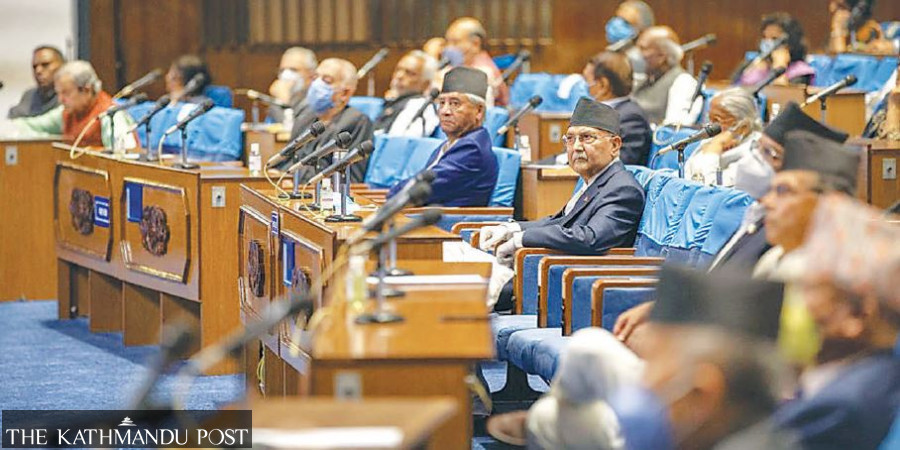Three and a half years after vote under new charter, the country is back to square one, and as polls are just around the corner, the spectre of the old vicious cycle looms large.

Political stability was the common refrain of Nepali politicians when they promulgated the constitution in 2015 and the first elections were held in the federal democratic Nepal in 2017. Two big communist forces—the CPN-UML and the Communist Party of Nepal (Maoist Centre)—went out on the hustings with their slogan “prosperity for stability”. People voted them to power. Their merger to form the Nepal Communist Party (NCP) meant the ruling party controlled close to a two-thirds majority in Parliament.
KP Sharma Oli was set to govern for the full five-year term, something that had not happened in over two and a half decades in the country. But three and a half years down the line, it looks like political stability is a chimera in Nepal, something Nepali people can wish for but can never achieve.
Not only in Kathmandu, the communists led the governments in six out of seven provinces. But as the communist government fell in Kathmandu, largely fuelled by Oli’s misadventures, provinces too are seeing changes in government leadership, with more such changes expected in the coming months.
Observers say despite a strong electoral mandate, Oli set in motion a chain of events. After the first House dissolution by Oli, the Nepal Communist Party (NCP) got invalidated.
After the second House dissolution, Oli’s UML has split. Over the period, chief ministers in four provinces have been changed. Two of them were Oli’s close confidants. In two provinces, Oli has installed who he stole from the dissident faction. But they are in a precarious position. Exercises were on to unseat chief ministers in two other provinces, but they survived.
Experts and observers primarily blame Oli for sowing the seeds of instability but don’t rule out a lack of political culture among Nepali politicians across the political spectrum.
“Oli had a historic opportunity but he failed to save even his party from a split. Now governments are falling in provinces,” said Khimlal Devkota, an expert on federal affairs who was recently elected to the National Assembly. “Actually, the country lost an opportunity to achieve stability.”
Oli’s fate was almost sealed when he dissolved the House for a second time in May. The court not only restored the House but also defenestrated him, replacing him with Nepali Congress President Sher Bahadur Deuba.
From the very start, Deuba was on thin ice. Without splitting the UML, he was constantly under the threat of losing his chair. He issued an ordinance easing the party split provisions. The UML split. So did the Janata Samajbadi Party.
After the 2017 elections, there were four parties in Parliament, but after mergers, there were just three.
Now suddenly, there are six parties. And there are four independent members.
And the country is back to coalition politics, with Madhav Nepal’s newly registered CPN (Unified Socialist) taking the centre stage as it controls 23 seats in the 271-strong lower house.
It has been a month and a half since Deuba took the reins, but has not been able to give a full shape to his government.
“We were in the first phase of implementing the constitution, we were in the process of strengthening the federal system,” said Devkota. “But we failed. The game of government changes is back. We have lost focus.”
Devkota said he hoped there could be some semblance of stability until elections.
The country will head to the local polls in around seven months and the general election is due next year.
Political parties have already shifted their focus to polls now, and there already are talks about electoral alliances.
“During the past movements and struggles, we presumed our leaders and political parties had some vision, ideas and commitment… and even honesty,” said Hari Roka, a political observer.
“We thought after the last elections under the new constitution, our parties will work towards building institutions. We hoped they would remain within the constitutional framework and that they would work for the welfare of the people and the country. But that was not to be.”
According to Roka, institutions were rather weakened, the system was blatantly attacked and the principles of the rule of law and constitutionalism were thrown out of the window.
It has been more than three decades since Nepal’s political parties restored democracy. But as soon as multiparty democracy was restored, the game of musical chairs began. No government could rule, on an average, for more than nine months.
Even after 30 years, the same set of politicians prevail in the country, playing the same old power games.
Observers say it would be wrong to say that the country has not achieved anything over the three decades, but when it comes to political culture, it has rather seen massive degradation.
Politicians' penchant for power has grown, while corruption has become a norm, they say. Nepali politicians’ stability promise now sounds hollow, according to them.
Now, according to Bipin Adhikari, an expert on constitutional affairs, the basis for stability and undemocratic features has been badly shaken.
“Democratic features were compromised when Oli was in power. Now the ordinance brought by the Deuba government poses more threats to stability,” Adhikari told the Post. “If we do not seek remedy or any kind of new adjustment in the constitution, our quest for stability will just remain a noble pursuit, with no tangible achievement.”
Given the newly evolved political dynamics, the next election in 2021 is set to give a hung Parliament once again, the bane of Nepal for decades.
The most likely scenario, according to political observers, is the Nepali Congress emerging as the single largest party and the UML coming second. Local elections will make the picture clearer about the strength of Nepal’s CPN (Unified Socialist).
The split in the UML has raised the prospects of the Maoist Party, which was on the verge of losing its relevance.
Since a government formed together by the first and second parties is an undemocratic practice, a belief Deuba too holds dearly, chances of a Congress-Maoist alliance are likely even after the general elections.
But if history is any guide, a coalition government almost equals instability.
Stability, economic development, prosperity and uplifting the lives of the people were what the new constitution envisioned.
But unless political actors show the will to translate what is promised in the constitution into action, a constitution becomes just a document of promises, according to observers.
“The role of political parties is key to delivering on what is guaranteed by the constitution,” said Adhikari, the law professor.
Many say it’s strange that political parties put some strongest measures in place in the constitution and wrote some tough laws so as to ensure stability but failed to adhere to those even for one parliamentary term.
The constitution provisions that a no-confidence motion cannot be filed against a prime minister for at least two years. It was aimed at letting any government function for a minimum of two years, given the history of government changes every nine months.
The constitution also barred a majority prime minister from dissolving the House, given the history of prime ministers employing their residual powers to kill Parliament whenever their positions came under threat.
Since Oli commanded the majority, there was no question of a no-confidence motion, but he did dissolve the House after three years in power, in a move which was described by the top court as unconstitutional.
“Politicians’ will and adherence to rule of law and constitution are key to ensuring stability,” said Roka. “Only if they commit to constitutionalism can institutions grow stronger. But there was none. How can we achieve the objectives of the constitution and stability when our politicians show utter disregard for constitutionalism, rule of law and system?”














